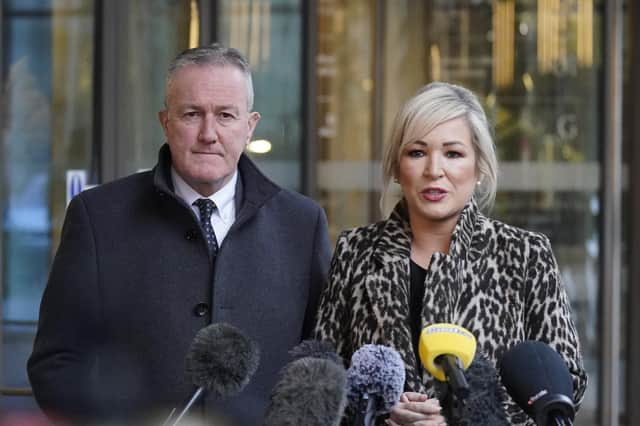Owen Polley: The DUP claim that the Irish Sea border has gone is a conjuring trick


(Ben Lowry: ‘It was as if on Saturday unionist opposition to the Irish Sea border and to Stormont no longer exists - and never did,’ February 5)
The scenario that I warned against repeatedly in this column is playing out at speed. The DUP is back at the assembly, and, in order to justify that decision, most of the party feels obliged to pretend that it made the Irish Sea border disappear.
Advertisement
Hide AdAdvertisement
Hide AdJust at the moment, many people are prepared to suspend their disbelief and enjoy this comforting illusion. But, despite the power of suggestion and efforts at misdirection, anybody with any sense knows deep down that it is just a conjuring trick.
Significantly, some senior members of the DUP are not fooled, as shown by an article in Saturday's News Letter by Sammy Wilson MP, Lord Dodds and Lord Morrow. They wrote, “There can be no dispute about it, there is still a border in the Irish Sea.” (Sammy Wilson, Lord Dodds, Lord Morrow: ‘There can be no dispute about it, there is still a border in the Irish Sea,’ February 10 2024)
As if to emphasise that point, even as Sir Jeffrey Donaldson was relishing his ‘achievement’, construction work continued on permanent border posts at Larne harbour. This is the infrastructure from which officials will man the supposedly non-existent frontier.
At the same time, the NIO minister, Steve Baker, was awarded an extra portfolio by the cabinet office. He has been asked to implement the framework that the DUP previously rejected, including the lane system that, apparently, no longer constitutes a border.
Advertisement
Hide AdAdvertisement
Hide AdMeanwhile, people who have to deal with reality are taking in the latest developments too.
The haulage industry, behind closed doors, is trying to absorb the news that its operations will be changed little by the Safeguarding the Union deal. Privately, many hauliers believe that critical issues have been ‘kicked down the road’ and question the idea that the border will be ‘seamless’ for goods staying in Northern Ireland.
Likewise, during a virtual presentation last week, the Northern Ireland Chamber of Commerce briefed its members on the likely effects of the DUP’s deal. One of its slides included the eye-catching euphemism: “Manufacturing movements are likely to remain ‘red lane’ heavy.”
In layman’s terms, that means most raw materials and components used by manufacturers here will still have to go through a burdensome process of checks and bureaucracy. Though they are moving from the mainland to Northern Ireland, they will be treated as if they were entering a foreign country.
Advertisement
Hide AdAdvertisement
Hide AdThe economist, Dr Esmond Birnie, estimated recently that roughly £2 billion worth of goods would still need to use the ‘red lane’, despite the deal. This flow includes items, he said, that will not move on into the Republic of Ireland or the rest of the EU. Indeed, “much (of this volume of trade) will be for sale in Northern Ireland or Great Britain or the wider world outside of the EU”.
If you linger on these details, you are likely to be accused of ‘getting caught in the weeds’, or missing the broader significance of the fact that there is a deal (any deal). They are the practicalities, though, that businesses have no choice but to wrestle with daily, particularly if their main suppliers come from the rest of the United Kingdom.
And that is before we consider significant constitutional issues that have not been solved, like the continued application of EU law in Northern Ireland.
As Ben noted, these problems were scarcely mentioned at Stormont last week. And when the TUV MLA, Jim Allister, dared to ask questions about this new dispensation, he was accused by Alliance leader, Naomi Long, of abusing the democratic process and ‘party politicking’.
Advertisement
Hide AdAdvertisement
Hide AdAmong the many problems with devolution in Northern Ireland is the fact that decision-makers are too seldom held to account. Our system is blighted by a lack of openness, but woe betide anyone who attempts to peek behind the curtain and establish, in this case, the truth about our new and disputed border arrangements.
While Mr Allister asked awkward questions and other unionists avoided them, Sinn Fein was less coy about the Irish Sea border.
The new economy minister, Conor Murphy, urged businesses to take ‘full advantage’ of the Windsor Framework. He said that the arrangements would protect “the thriving all Ireland economy” and it was “important to build on this”.
It would be silly, of course, to fall for Sinn Fein’s propaganda.
Advertisement
Hide AdAdvertisement
Hide AdNorthern Ireland’s most important economic relationships, by far, are still with the rest of the UK and that will continue to be the case. Yet, the figures suggest that the Irish Sea border really has caused diversion of trade, as companies replaced items that became trickier to buy from GB with products from the Republic.
When the latest executive was selected through the d’Hondt system, the DUP appeared to avoid ministries linked to the economy.
That decision will grant Sinn Fein more opportunities to claim that Northern Ireland’s future prosperity depends upon forging closer links with the Republic. Sir Jeffrey will counter that his deal established new bodies, like Intertrade UK, that are supposed to promote business with the mainland.
By accepting the government’s offer, though, Donaldson's wing of the DUP joined the UUP in making the argument that the Union would best be promoted by restoring Stormont. The barriers to achieving that in this assembly will be greater.
A good start would be more honesty about the true scope of its deal.